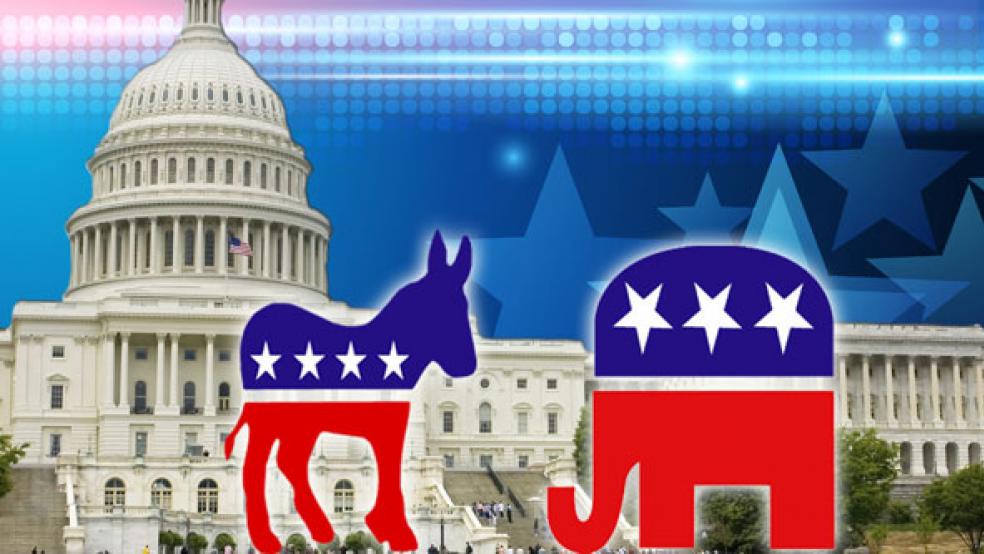Bipartisanship is supposed to be the new spring fashion on Capitol Hill. Senators are crossing party lines on gun control and immigration reform, joining together in the kinds of “gangs” that are supposed to arouse public confidence instead of suspicion about criminal activities.

The Senate voted last week to allow debate on a compromise proposal to expand background checks on gun purchases. And scheduled for Tuesday is a full outline of the bipartisan revamp of immigration laws by the “Gang of Eight,” which would pave a decade-long path for millions of illegal immigrants to citizenship. Another Senate gang is reportedly forming to tackle the deficit, something that past gangs failed to accomplish.
All of this invites optimism that Capitol Hill has finally turned a corner on gridlock. But previous so-called breakthroughs have been busts. Why is this time different?
There are ideological, political and geographic pressures weighing on lawmakers, who are already focused on the 2014 mid-term elections. The eternal campaign will make it difficult – if not impossible –to buck the National Rifle Association, or for Republicans to give a cold shoulder to the anti-immigration reform interests who argue that any kind of amnesty will be costly and counterproductive.
Political intrigue and personality clashes will also be a factor: Minority Leader Mitch McConnell, R-Ky., facing a potentially tough reelection campaign next year, has vowed to do everything he can to block gun control legislation, and reportedly has no interest in talking with Senate Majority Leader Harry Reid, D-Nev., about a grand bargain.
Also, Jim DeMint, the former conservative Republican senator from South Carolina, just assumed the reins of the Heritage Foundation and is waging an all-out effort to block immigration reform. House Majority Leader Eric Cantor, R-Va., recently circulated a list of legislative priorities for the year that contained nothing about gun control or immigration reform. And liberal Democrats in the House and Senate last week were angered by President Obama’s new budget plan calling for cuts in Medicare and Social Security benefits.
Obama has repeatedly extended the olive branch to Republican lawmakers with a series of private dinners and closed-door meetings on Capitol Hill and at the White House, in addition to tailoring his fiscal 2014 budget proposal with a number of features – including cuts in Medicare and Social Security – to attract GOP support. But so far, the Republican response has ranged from outright hostility to tepid praise.
“Divided, polarized government usually kills comprehensive reform of anything, sooner or later,” said Larry Sabato, a University of Virginia political scientist. “Incremental changes are the best bet, and even they are far from assured.”
While anything is possible, here is the current lay of the land amid all the signs of bipartisanship.
GUN CONTROL: Sixty-six senators were moved last week by the pleas of the families of the victims of the Sandy Hook Elementary School massacre to overcome a threatened filibuster on gun control legislation. Nicole Hockley and other Sandy Hook parents flew to Washington aboard Air Force One and fanned out across Capitol Hill, urging lawmakers to at least give the legislation an up or down vote.
Yet many of those 50 Democrats and 16 Republicans who decided to proceed with a vote will likely oppose the proposal by Sens. Joe Manchin III, D-W.Va., and Pat Toomey, R-Pa., to expand criminal background checks for firearm sales to gun shows and on the Internet. While the Citizens Committee for the Right to Keep and Bear Arms, the second largest gun-rights group in the country, came out over the weekend for the Manchin-Toomey plan, the powerful National Rifle Association and its allies are waging an all-out fight to block the bill – portraying it as an attempt to abridge the Second Amendment.
The controversy underscores the deep political divide between rural areas, with their strong tradition of hunting and gun rights, and urban and suburban areas, where there is growing support for stricter firearms regulations. Intra-party tensions are running high over the geographic divide. Moderate Republican Sen. Susan Collins of Maine complained during a closed-door luncheon last week about a series of attack ads she was facing back home from a gun-rights group with strong ties to Republican Sen. Rand Paul of Kentucky, The New York Times reported on Monday.
Finally, any gun control measure that emerges from the Senate will face potentially debilitating obstacles in the House, making some senators unwilling to risk their political capital with an “aye” vote. “I think it’s an open question as to whether or not we have the votes,” Toomey said Sunday on CNN. “I think it’s going to be close.”
IMMIGRATION REFORM: The prospects for passage of immigration reform appear much brighter, if for no other reason than Republicans seeing it as essential for improving their standing with Hispanic voters. Freshman Sen. Marco Rubio, R-Fla., a presidential aspirant, has taken a leading role in negotiating a compromise – a point he hammered home on Sunday with appearances on seven talk shows.
The group made its “tough but fair path” to citizenship contingent on securing the U.S. borders and tracking whether legal immigrants have left the country when required. The proposal would also create an employment verification system to discourage identity theft, while devising a new visa system to allow highly skilled and farm workers into the country to fill employer needs.
Rubio and his seven Democratic and Republican colleagues believe they have come up with the proper mix of incentives and safeguards for dealing with the 11 million undocumented immigrants living in this country. But they will face strong opposition from many who argue that the reforms would prove too costly to the government and are tantamount to granting amnesty to scofflaws and criminals.
The Florida senator said the plan is more rigorous than the current system that allows undocumented immigrants to return to their native countries and apply for a green card after a 10-year wait. “It’s going to be cheaper and easier to come legally,” Rubio told CNN’s Candy Crowley.
Republican pollster Whit Ayres said yesterday that “there’s a reasonable shot” that the gang’s plan would draw substantial support in the Senate – “maybe 70—plus votes.”
“That’s because it is truly bipartisan,” Ayres told The Fiscal Times. “It’s amazing what you can get done if you actually take account of what both sides want and people of different perspectives want. And that’s exactly what this group of eight senators has put together on immigration reform.”
BUDGET COMPROMISE: Sen. Mark Warner might be the biggest aficionado of gangs since Butch Cassidy. In trying to forge a consensus on deficit reduction, the Virginia Democrat has previously led a bipartisan gang of six and—later—a gang of eight. Warner has reportedly been in talks with Sen. Saxby Chambliss, R-Ga., to regroup for a third time, according to Politico.
The willingness for Democrats and Republican to work together is a positive. But any budget deal must also go through the White House and the Republican majority House. Obama has requested $580 billion in tax hikes for a budget that reduces the annual deficit from $744 billion in 2014 to $439 billion in 2023. House Republicans passed a budget with no additional revenues that balances in 2023, but largely does so by gutting expenditures tied to Obamacare.
Pollster John Zogby observed in comments to The Fiscal Times: “Whereas gun control and immigration are really do or die for a competitive GOP, the budget debate is at an impasse and a draw right now. But as the retiring Meat Loaf once said, "two out of three ain't bad."




